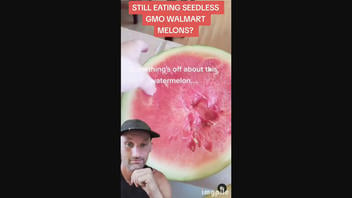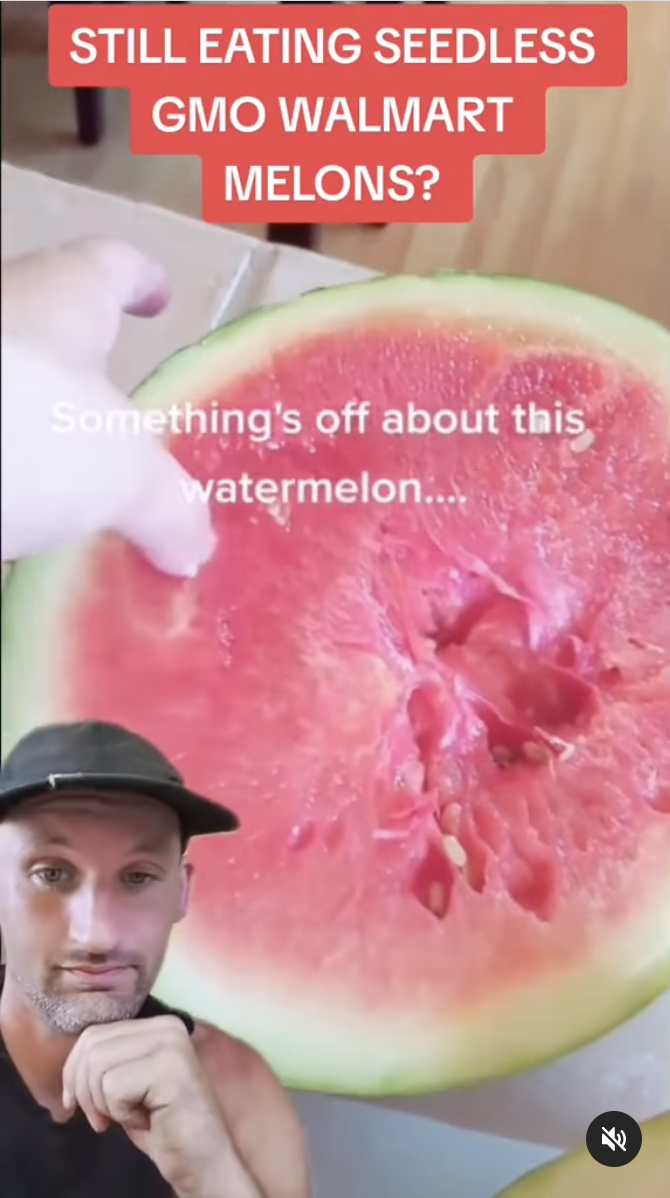
Are seedless watermelons genetically modified organism (GMO) products, and are they poisonous? No, that's not true: A representative of Walmart, one of many stores that sell seedless watermelons, told Lead Stories that these claims are false. An article published by Michigan State University reported that "No current seedless plants are genetically modified organisms (GMOs)." Also, a previous Lead Stories fact check reported that multiple plant genetic experts confirmed that seedless fruits are safe for humans to eat.
The claim appeared in a post on Instagram on July 2, 2023. The caption opened:
The 👿 is in THE DETAILS. #seedless #gmo #watermelon #walmart
Superimposed text at the top of the reposted TikTok video in the Instagram post reads:
STILL EATING SEEDLESS GMO WALMART MELONS?
This is what the post looked like on Instagram at the time of writing:
(Source: Instagram screenshot taken on Mon Aug 07 14:11:05 2023 UTC)
Narration in the post includes this claim: "Seedless watermelon is poisonous and will mess with your genes and hormones." The post gives no evidence to support that claim. Lead Stories has previously debunked claims about seedless fruit, confirming such products are safe to eat.
It is unclear whether the person seen in the video is handling a fresh or even real watermelon. A U.S. Department of Agriculture (USDA) report found that prefrozen melon balls could have a rubbery texture, like the oddly textured, pink melon in the video post.
This is not the first time Lead Stories has fact checked the social media user @primal_dad_truther, who is seen in the bottom left of the reposted TikTok video in the post. He is central to a February 8, 2023, fact check about an oil he was selling that purportedly reversed hair loss.
Madalyn Klika, a senior manager of global communications at Walmart, told Lead Stories in an email on August 7, 2023, that "these claims are false."
A search of the Walmart website displayed seedless watermelon seeds that are specifically labeled "Non-GMO." It also produced results that show a combination of seeded and seedless fresh watermelons.
While the claim mentions Walmart specifically, it's not clear why just Walmart was mentioned since many grocery stores and grocery chains in the U.S. also sell seedless watermelons.
A January 3, 2019, Michigan State University Extension blog post titled, "Seedless fruit is not something new," reported:
Seedless plants are not common, but they do exist naturally or can be manipulated by plant breeders without using genetic engineering techniques. No current seedless plants are genetically modified organisms (GMOs).
An August 21, 2019, Non-GMO Project article described how seedless watermelons are naturally produced via crossbreeding:
Seedless watermelons are triploid, which means they have three copies of their chromosomes rather than two. This renders them sterile, which of course means no seeds to pick out. These watermelons are created by crossing a common diploid watermelon (two copies of each chromosome, just like most humans) with a tetraploid watermelon (which has four copies). Each plant passes on half its genetic information, so the prodigy ends up with three pairs of chromosomes and no viable seeds. Interestingly, our typical (Cavendish) bananas are seedless for the same reason: they are just triploid plantains!
Lead Stories previously found the claim that "seedless fruits sterilize humans" to be false. In that fact check, Brian Ellis, a professor emeritus of the University of British Columbia's Department of Botany, told Lead Stories via email on November 18, 2022, why this claim was false concerning the natural reproduction process of plants:
I can see no reason why a plant that has lost its ability to produce seeds should have any deleterious effects on humans when consumed (especially any impact on human fertility!)
Many biochemical steps are involved in plant seed formation, and any mutation that causes one of those steps to fail will usually block seed production.
Of course, such a failure would also make it difficult for the plant to reproduce; i.e. seedless plants are typically not going to produce offspring. This means that horticulturists must take special measures to block seed production while still allowing them to propagate the plant (for example, propagation through cuttings).
Lead Stories also debunked the claim that "watermelons with ringed marks are dangerous to eat."
Lead Stories has reached out to the USDA, Food and Drug Administration, and endocrinology experts who can address the "hormone poison" portion of this claim. If a response is received from any of these sources, this fact check will be updated.
Additional Lead Stories fact checks about seedless fruit can be read here.



















